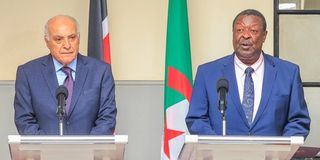Kenya's tricky balancing act on Algeria amid Moroccan onslaught

Algerian Foreign Minister Ahmed Attaf was in Nairobi on Monday for a one-day visit that officials said was aimed at strengthening a historic partnership.
Algerian Foreign Minister Ahmed Attaf was in Nairobi on Monday for a one-day visit that officials said was aimed at strengthening a historic partnership.
But apart from the fact that they held a 'joint press conference' that did not include independent media, the trip took place against the backdrop of Nairobi's serious rapprochement with Algerian rival Morocco.
Attaf and his host, Cabinet Secretary for Foreign and Diaspora Affairs Musalia Mudavadi, did not mention Morocco by name.
In fact, Mudavadi focused on economic reasons, pointing out that Algeria is Kenya's "valued partner" in various sectors such as trade, agriculture, educational cooperation, infrastructure and energy.
In January, Algeria donated 16,000 tonnes of urea, a top-dressing fertiliser commonly used to grow maize, wheat and sugar cane. This was worth $4.8 million.
Algeria also donated some $100,000 to Kenya's controversial mission to Haiti, which is currently mired in legal battles in Nairobi and political wrangling in the US Congress over funding. Washington is seen as the main guarantor of the UN-approved Multinational Security Support Mission (MSSM) to Haiti, which Kenya has agreed to lead. But it will cost money, and Kenya has asked donors to fund it.
Back to Algeria, Mudavadi said: "Kenya is committed to strengthening the bonds of friendship for the benefit of our people and the entire African continent." He lamented the low level of trade between the two sides, with Kenya exporting Sh106 million worth of goods to Algeria but buying Sh206 million from there.
A Joint Economic Commission, a bilateral body of the two sides, is expected to revive efforts to explore business opportunities later in June, he said.
Travelling to Nairobi
But the trip was more symbolic than business. Algeria's top diplomat said he was travelling to Nairobi because he saw the need for close ties amid rising global tensions.
He said there had been “deteriorating regional and international environments,” which he said included Palestine, East Africa and the Sahel-Saharan regions.
“My visit comes as you all know at a time when the world is undergoing profound and exhilarating changes and ever-increasing tensions, crises and conflicts that continue to imply huge challenges both at international and regional levels. In such times of great uncertainties, we firmly believe in the vital importance of maintaining close contacts,” Attaf said.
Algeria and Morocco have effectively closed their borders to each other, so technically they have no diplomatic contacts.
The meeting also came as Kenya stepped up efforts to open relations with Morocco. Attaf arrived as parliament vetted the country's first ambassadorial nominee to Rabat, Jessica Gakinya. She is due to report by June.
In addition, Kenya's embassy in Algiers, which is normally accredited to the Sahrawi Arab Democratic Republic (SADR), will no longer do so following recent changes in Nairobi's stance. This is important because Morocco claims the territory controlled by the SADR, which is run by a government in exile in refugee camps in Algeria.
Since September 2022, the Kenyan government has been toying with the idea of breaking off relations with the Sahrawis, although officials say this won't affect relations with Algeria, one of SADR's biggest supporters.
Shortly after taking office, President William Ruto initially announced he would close the Sahrawi mission in Nairobi before the foreign ministry backtracked and said it would work with the African Union's position. At the same time, Morocco announced a donation of fertiliser to Nairobi.
However, the African Union has struggled to resolve the issue and Morocco now wants the matter to be resolved under the auspices of the United Nations Security Council. The two sides, Morocco and the SADR disagree on whether autonomy or full independence should be granted. Rabat favours the former.
Last month, Kenya sent Foreign Affairs Principal Secretary Korir Sing'oei to Rabat to deliver a special message on relations.





